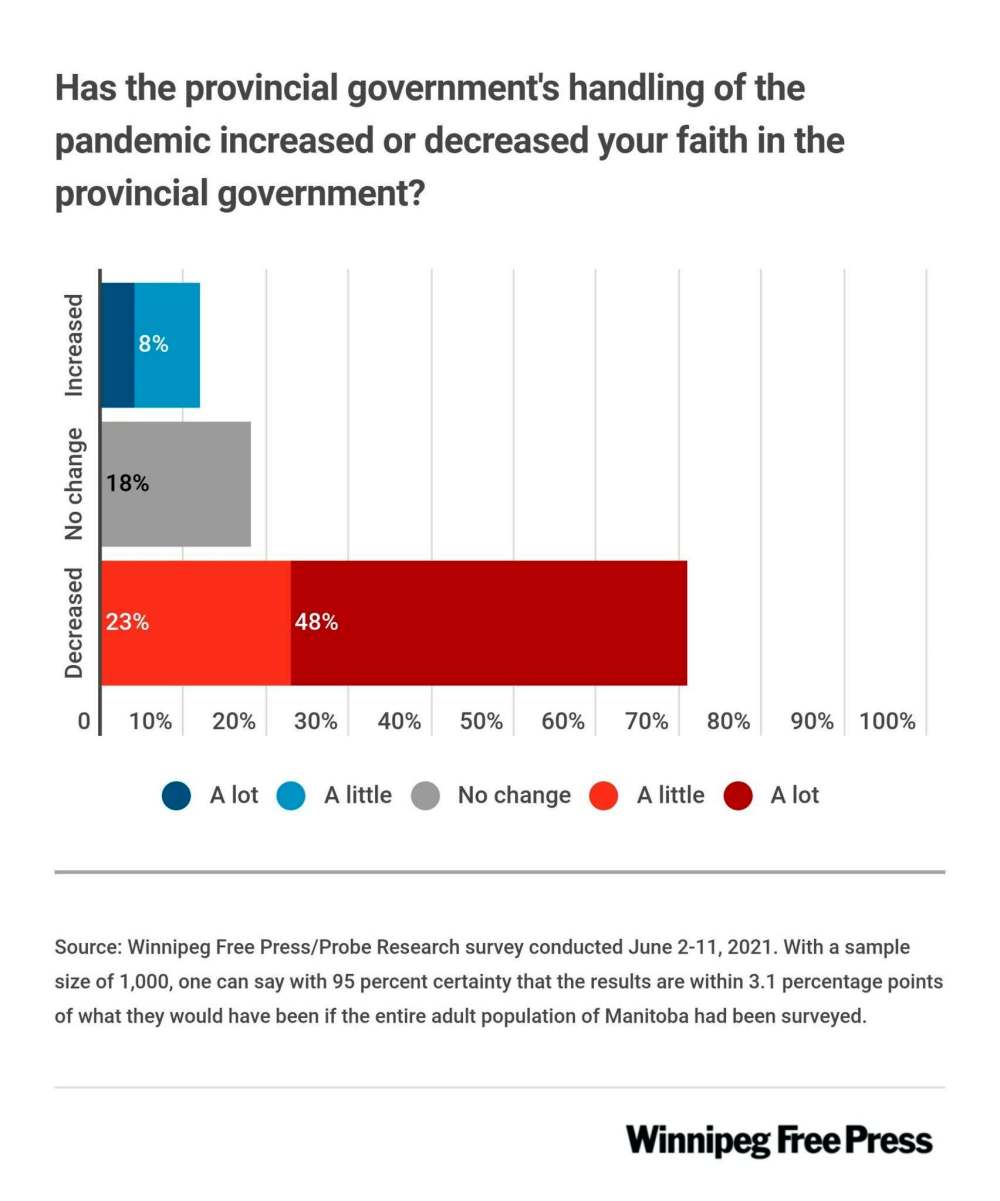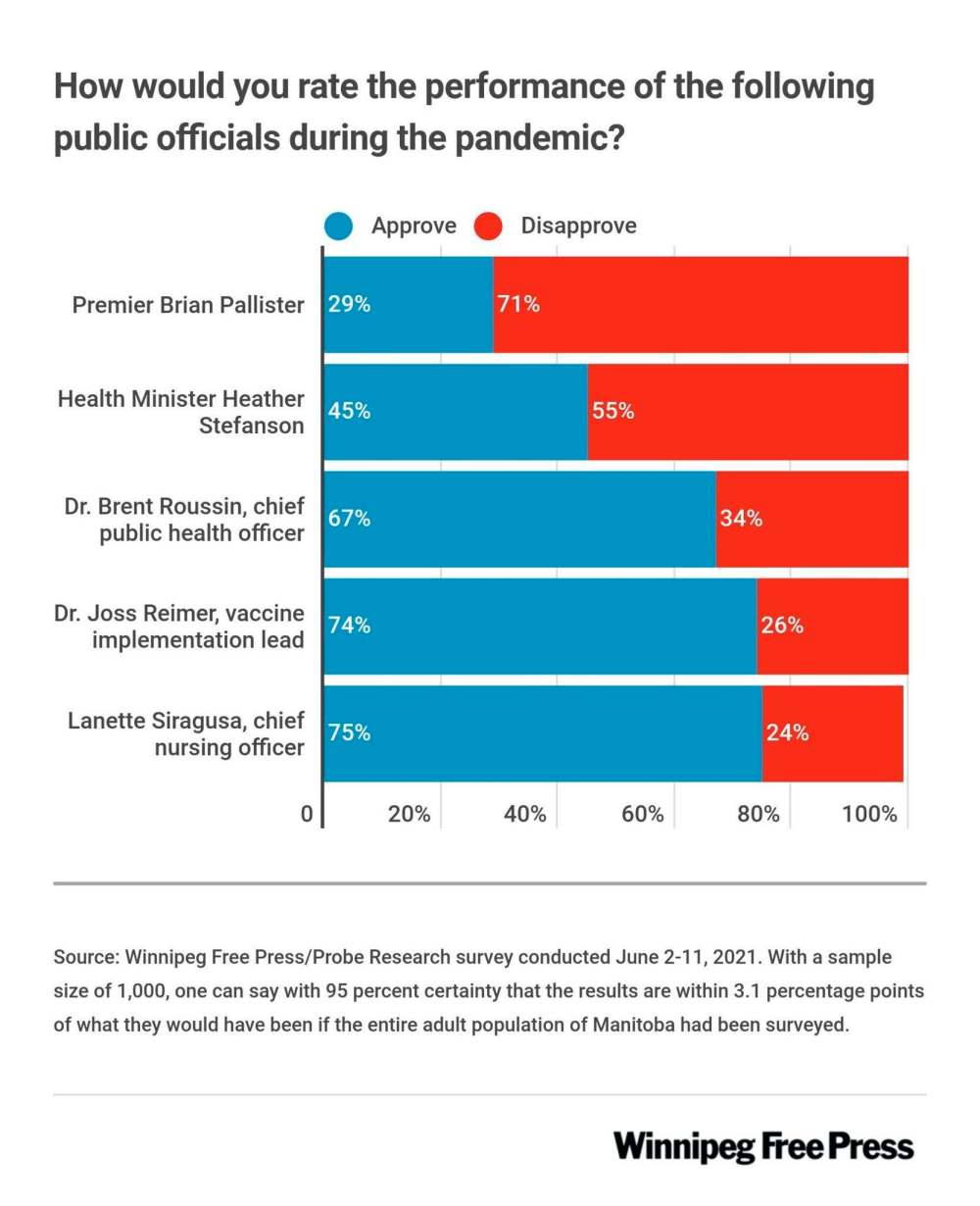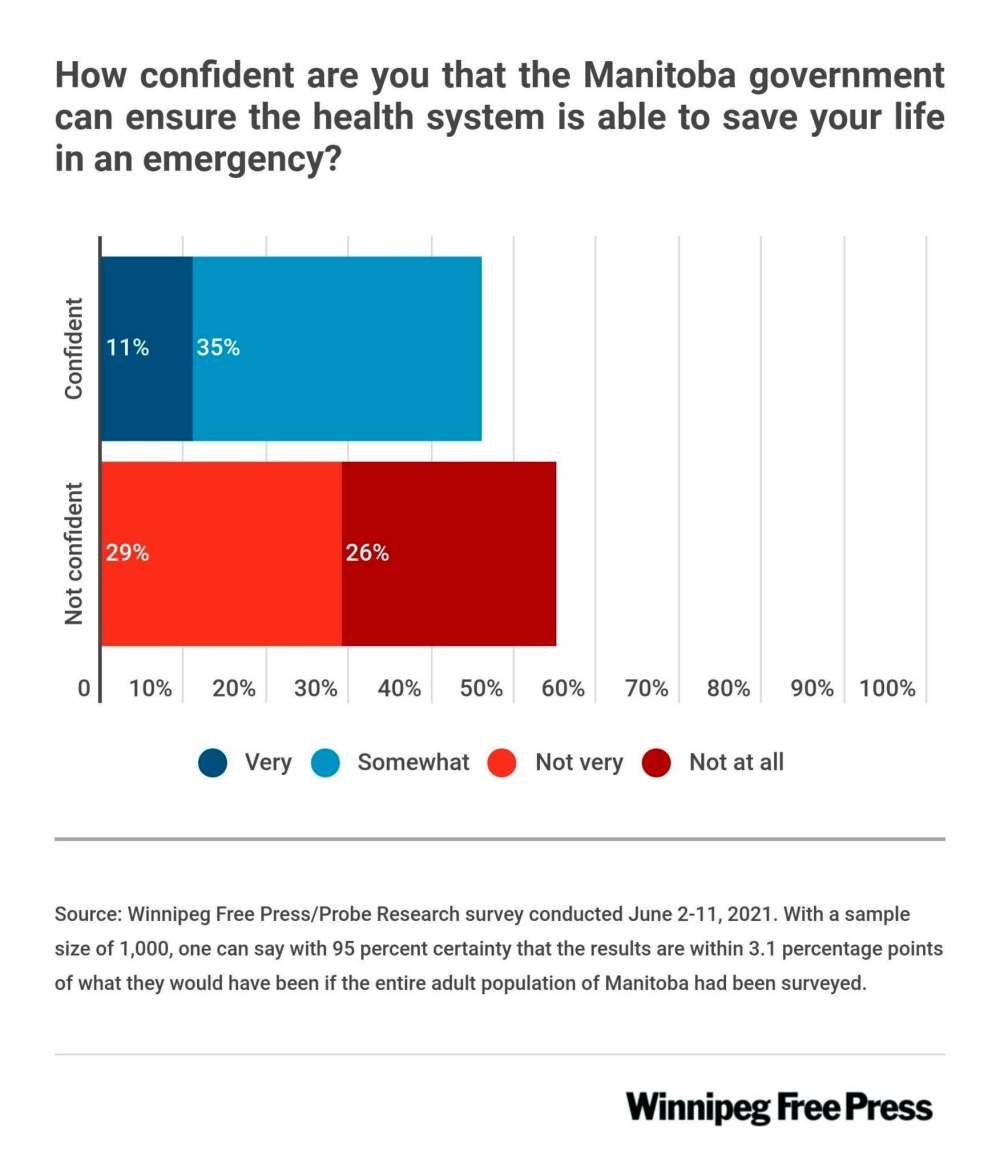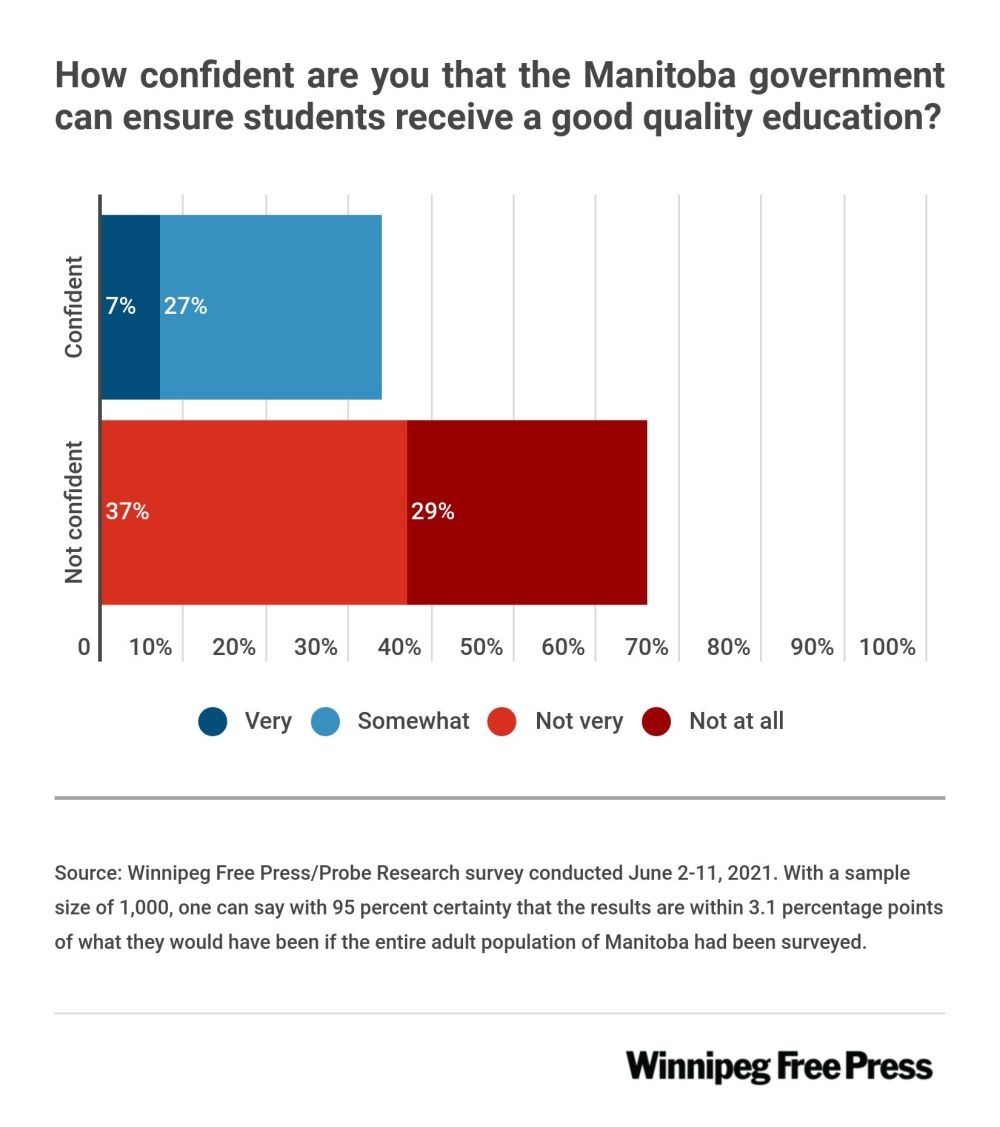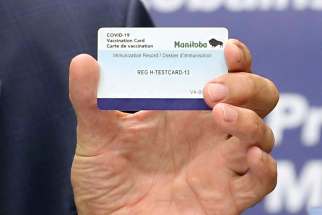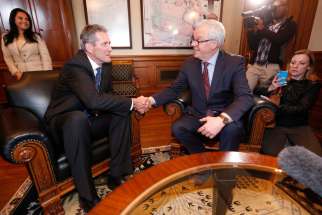‘Shaken’ Manitobans losing faith in provincial government: poll
Read this article for free:
or
Already have an account? Log in here »
To continue reading, please subscribe:
Monthly Digital Subscription
$0 for the first 4 weeks*
- Enjoy unlimited reading on winnipegfreepress.com
- Read the E-Edition, our digital replica newspaper
- Access News Break, our award-winning app
- Play interactive puzzles
*No charge for 4 weeks then price increases to the regular rate of $19.00 plus GST every four weeks. Offer available to new and qualified returning subscribers only. Cancel any time.
Monthly Digital Subscription
$4.75/week*
- Enjoy unlimited reading on winnipegfreepress.com
- Read the E-Edition, our digital replica newspaper
- Access News Break, our award-winning app
- Play interactive puzzles
*Billed as $19 plus GST every four weeks. Cancel any time.
To continue reading, please subscribe:
Add Free Press access to your Brandon Sun subscription for only an additional
$1 for the first 4 weeks*
*Your next subscription payment will increase by $1.00 and you will be charged $16.99 plus GST for four weeks. After four weeks, your payment will increase to $23.99 plus GST every four weeks.
Read unlimited articles for free today:
or
Already have an account? Log in here »
Hey there, time traveller!
This article was published 18/06/2021 (1635 days ago), so information in it may no longer be current.
Manitobans feel abandoned by their government, with fewer than half trusting the province could save their lives in an emergency or provide their children with an adequate education.
In a poll conducted for the Winnipeg Free Press, a staggering 71 per cent of Manitobans say the Progressive Conservative-led handling of the COVID-19 pandemic has decreased their faith in the province.
“I think everyone would expect more from their government than this,” Probe Research founder Scott MacKay said.
“These are the essential services of the government, and these numbers aren’t at all inspiring.”
MacKay’s firm surveyed 1,000 Manitoba residents earlier this month, and found just 46 per cent were confident the province could offer life-saving medical care. Only slightly more than one-third feel the government can effectively respond to crises, or provide a quality education.
Experts ranked higher than politicians
All the public faces of Manitoba’s COVID-19 pandemic response have faced a drop in their approval ratings, but officials rank much higher than PC ministers.
Just 29 per cent of Probe/Free Press poll respondents support Premier Brian Pallister’s handling of the pandemic, down from 41 per cent in October. This month, Health Minister Heather Stefanson — who is on medical leave — got 45 per cent approval.
All the public faces of Manitoba’s COVID-19 pandemic response have faced a drop in their approval ratings, but officials rank much higher than PC ministers.
Just 29 per cent of Probe/Free Press poll respondents support Premier Brian Pallister’s handling of the pandemic, down from 41 per cent in October. This month, Health Minister Heather Stefanson — who is on medical leave — got 45 per cent approval.
The province’s top doctor got 67 per cent approval this time around, though Dr. Brent Roussin logged 81 per cent approval eight months prior.
Political scientist Paul Thomas noted Roussin makes public the restrictions and public health orders ultimately decided by the elected PC government.
“Roussin doesn’t have final decision-making in our system of government; the premier and the cabinet and the ministers are responsible, and answer to the legislature,” he said. “Roussin gives advice.”
Meanwhile, Shared Health chief nursing officer Lanette Siragusa has slipped to 75 per cent support (from 83 per cent), which observers chalked up to a sparse public profile, only making media appearances when the health-care system is under extra strain.
Dr. Joss Reimer, medical lead of the vaccine rollout task force, is one of the most popular people in Manitoba, with 74 per cent support.
Thomas chalked that up to vaccines being better news than restrictions, but also a straightforward communication style grounded in studies from across the world.
“She’s a pretty poised communicator; she doesn’t get rattled. Roussin sometimes is repetitive, and it wasn’t part of his job description to hold a weekly reality TV show for the media,” he said.
Thomas noted, in general, the public has mistrust toward elected officials.
“If you need to chose someone with credentials, and is expected to be more objective and truthful, over a premier who has played fast and lose with the truth in the past, it’s not surprising the public health officials come out ahead of the premier, or even other ministers.”
— Dylan Robertson
Long-time political scientist Paul Thomas said Manitobans originally feared COVID-19 and trusted officials to keep them safe. But they’ve been through months of restrictions, as well as constant bad news about case rates and a lack of preparedness for the second and third waves.
“As this thing drags on, and the impact of the disease becomes more severe, that trust erodes,” said Thomas, a professor emeritus with the University of Manitoba.
Thomas has studied how people assess competence, and says they tend to have higher opinions of services they don’t use. For example, many believe firefighters respond promptly as needed, in part because few people ever have to call 911.
He said the opposite view could be happening as Manitoba families grappled with online schooling, and are constantly hearing the health-care system is in crisis.
For example, the PCs have long-argued federal underfunding leads to late cancer diagnoses, while opposition parties and unions constantly decry controversial health reforms.
“The single most contentious issue since the Pallister government arrived in power (2016) has been the health-care system. People have been bombarded non-stop with negative information,” Thomas said.
The 2019 election included talk of overworked nurses, consolidated emergency rooms, and air ambulance reforms.
“People take that in, in a kind of kaleidoscopic, headline way. They don’t know what’s happening behind the scenes, but they feel… you should do everything you possibly can to stay away from it, because if you go to the emergency room, you’ll wait seven hours.”
Methodology
Probe Research surveyed a random and representative sample of 1,000 adults in Manitoba, from June 2 to 11.
The survey results are plus or minus 3.1 percentage points of what they would’ve been if the entire adult population had been surveyed, with 95 per cent certainty.
The questions were phrased:
1) Thinking about the provincial government as a whole right now — the elected officials and the public service — how confident are you that the Manitoba government can do the following?
2) And, has the provincial government’s handling of the pandemic increased or decreased your faith in the provincial government?
MacKay said most Canadians believe the health-care system involves long waits and rationing, at the best of times.
“Manitobans were shaken by the pandemic, and particularly by the spectre of people being airlifted out of the province,” he said, noting ICU patients were being flown out to Ontario and Saskatchewan as staff conducted its polling.
“It was very startling to Manitobans to see that, especially when we realized that we’re the only people doing this. Nobody had heard of this happening anywhere else.”
Brandon University political scientist Kelly Saunders said she hears a pervasive sense of disappointment and frustration from the public, including on non-pandemic topics such as the Bill 64 school reform and antagonistic union talks.
“It’s like we’re mad at them for one thing, and now it’s carrying over to other things,” she said. “This sense of disappointment has crept into all areas of government.”
Women were more likely to report a drop in trust toward the province, at 75 per cent, compared with 65 per cent of men. The sentiment is more prominent among Manitobans aged 18 to 34.
Saunders noted women are often caretakers for children or aging parents, and often work as teachers, grocery clerks, restaurant servers or nurses — all of which have been impacted by the pandemic.
Yet, MacKay said, the overall 71 per cent of Manitobans reporting a drop in confidence in the province means demographic differences barely matter. Even two-thirds of rural respondents have less confidence, and MacKay argues this reflected in the PCs’ tanking approval rating.
“It sort of explains why those numbers have plummeted so badly in voting intention, because these things are interconnected.”
Jack Lindsay, an emergency-management expert at Brandon University, said Manitoba’s pandemic response is not just shaped by the government, though experts have urged officials for years to improve contingency planning and to nudge businesses to also do so.
“I do worry about companies and government departments that were not well-prepared for the consequences of the pandemic,” he said. “A novel virus outbreak has been high on the risk assessment for decades.”
dylan.robertson@freepress.mb.ca
Probe polling on faith in provincial government, party support

